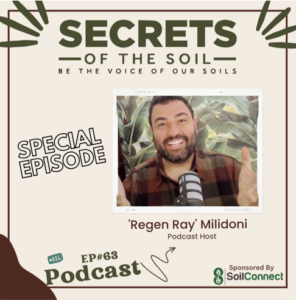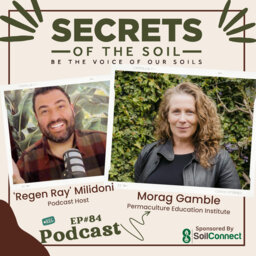I’m thrilled to announce the release of our latest episode on the “Secrets of the Soil” podcast, titled “7 Ways To Supercharge Your Soil,” featuring none other than myself, Regen Ray Milidoni! 🎙️
In this solo episode, I dive deep into practical methods you can implement today to improve soil health and, ultimately, help save our planet. If you care about agriculture, gardening, or just love getting your hands dirty, this episode is for you! 🌍🌾
Here are three key takeaways from the episode:
🔹 Power Up with Organic Matter: Learn how adding compost can vastly improve the organic matter in your soil, leading to healthier plants and more efficient farming. Techniques include using liquid fertilizers, inoculating seeds, and even utilizing herding animals.
🔹 Chill Out with Low Till: Understand the importance of reducing soil disturbance to maintain its structure and prevent erosion. This approach helps preserve the beneficial microorganisms and fungi in the soil, leading to long-term soil health improvements.
🔹 Get Jiggy with Cover Crops: Discover why cover crops are a game-changer for both soil health and crop yield. They not only prevent erosion but also improve nitrogen content and overall soil quality while providing natural pest control.
For a deeper dive and to get a handy PDF guide with all these tips and more, visit [secretsofthesoil.com/guide].
Tune in to our latest episode today and uncover the secrets to supercharging your soil!
As the host of the Secrets of the Soil podcast, I’ve had the privilege of speaking with some of the most innovative and inspiring experts in regenerative agriculture.
Through these conversations, I’ve learned so much about the power of nurturing soil and promoting regeneration.Now, after many podcast recordings and countless hours of research and reflection, I’m thrilled to share this kick-ass guide with you.“Regen Rays 7 Ways to Supercharge Your Soil & Save the Planet” is a distillation of the most important and actionable insights from my podcast guests, along with some fun and empowering tips to help you take your soil to the next level.So whether you’re an experienced farmer, a gardening enthusiast, or simply someone who cares about the planet, I hope this guide inspires you to take action and make a positive impact on the world around you!

Maintaining and improving soil health is fundamental for sustainable agriculture and the health of our planet. In the latest episode of “Secrets of the Soil,” host Regen Ray Milidoni dives into an enlightening guide detailing seven indispensable ways to supercharge your soil. Here, we expand on the key takeaways from the episode to empower you with transformative practices for soil enhancement.
Power Up with Organic Matter
Organic matter is essential for soil fertility, offering a rich source of nutrients and improving soil structure. Methods to augment organic matter include compost application, whether it’s home-made or commercially obtained. In farming, liquid organic fertilizers can be sprayed or inoculated on seeds to create a synergy of beneficial biomes right from the start. The goal is to enrich the soil with nutrients, ensuring robust root development and plant health. From backyard compost heaps to advanced windrow composting, organic matter application is an adaptable practice crucial for soil vitality.
Chill Out with Low Till
The traditional practice of tilling, while effective in the short-term, can harm soil structure, reduce water retention, and harm microbial life. By reducing tillage, we protect the fragile top layer of soil where vital microorganisms thrive. No-till farming ensures better soil aeration and preserves the organic matter, resulting in less erosion and better moisture retention. While some tillage may occasionally be necessary, prioritizing minimal disruption can greatly benefit long-term soil health.
Get Jiggy with Cover Crops
Cover cropping is an effective strategy to keep soils healthy, reducing erosion, increasing organic matter, and enhancing biodiversity. Cover crops like clovers, radishes, and rye contribute to nutrient cycling in the soil, fixing nitrogen, and preventing nutrient leaching. Mixed-species cover crops can be tailored to address specific soil deficiencies, mitigating imbalances, and producing a dynamic, thriving soil ecosystem. Morning dew collected on these plants also helps maintain soil moisture, extending the benefits even in drier conditions.
Mix It Up with Crop Rotation
Crop rotation is another cornerstone of sustainable agriculture. By alternating the crops grown in each field, soil nutrients can be managed and pest cycles disrupted. Diverse crops draw on different nutrients, preventing depletion of specific minerals. This practice also encourages a varied root structure, which helps maintain soil integrity. Rotation can include integrating cover crops or leaving some fields fallow, thereby rejuvenating the soil for future planting cycles.
Party with Companion Planting
Companion planting is an age-old practice where certain plants are grown together to mutual benefit. For instance, basil planted next to tomatoes can repel pests and enhance growth. Syntropic farming takes this concept to a larger scale, arranging plant layers in a way that mimics natural ecosystems. This method encourages plant cooperation rather than competition, optimizing nutrient uptake and pest resistance naturally. The synergy created by companion planting fosters healthier plants and richer soil.
Go Natural with Fertilizers
Conventional fertilizers can sometimes undermine soil health, disrupting the ecological balance. Naturals alternatives like compost teas, bio-stimulants, and animal manure offer nutrient-rich solutions that are better assimilated by plants. Local materials, such as fallen branches and local waste, can be composted to create a fingerprint-specific fertilizer, nurturing the soil without causing ecological shock. Embracing natural fertilizers promotes a thriving soil microbiome and reduces reliance on synthetic substances.
Embrace the Regenerative Mindset
Conventional fertilizers can sometimes undermine soil health, disrupting the ecological balance. Naturals alternatives like compost teas, bio-stimulants, and animal manure offer nutrient-rich solutions that are better assimilated by plants. Local materials, such as fallen branches and local waste, can be composted to create a fingerprint-specific fertilizer, nurturing the soil without causing ecological shock. Embracing natural fertilizers promotes a thriving soil microbiome and reduces reliance on synthetic substances.
Above all, adopting a regenerative mindset is crucial. This involves seeing soil beyond productivity metrics, recognizing its central role in the ecosystem. Farmers and gardeners can change their perspective, shifting from a focus on yields to holistic soil stewardship. Understanding the signs and signals of soil health allows for informed, sustainable decisions in land management. The regenerative approach nurtures the soil, in turn supporting plant, human, and planetary health.
Supercharging your soil through these seven steps can have profound impacts. Building organic matter, minimizing soil disturbance, using cover crops, rotating crops, engaging in companion planting, choosing natural fertilizers, and cultivating a regenerative mindset all contribute to soil regeneration. As Milidoni emphasized, these principles not only enhance soil health but also pave the way for sustainable agriculture and environmental stewardship.
Let’s dig deep, embrace these practices, and contribute to a healthier planet for generations to come.
Have thoughts, questions, or additional tips on supercharging soil? Share your insights in the comments below, and make sure to check out the full episode of “Secrets of the Soil” for even more in-depth discussions on soil health and regeneration.






